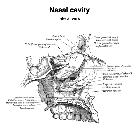Os sphenoidale

Sphenoid bone
• Sphenoid bone (Gray's illustrations) - Ganzer Fall bei Radiopaedia

Nasal cavity
• Nasal cavity (Gray's illustrations) - Ganzer Fall bei Radiopaedia

Cranial vault
• Skull and facial bones (illustrations) - Ganzer Fall bei Radiopaedia
The sphenoid bone is a large, complex, unpaired bone forming the central parts of the anterior and central skull base.
Gross anatomy
Parts of the sphenoid bone include:
Articulations
The sphenoid bone articulates with twelve bones:
- unpaired bones include: frontal, ethmoid, vomer, and occipital
- paired bones include: zygomatic, parietal, temporal, and palatine.
Fissures, foramina, grooves and canals
The sphenoid bone includes:
- optic canal
- superior orbital fissure
- foramen rotundum
- pterygoid canal
- foramen ovale
- foramen spinosum
- carotid groove
History and etymology
Galen (129-199) first described the bone by this name. It is derived from the Greek σφήν (sphen) meaning wedge. Some sources claim that the intended name was sphecoid, derived from Greek σφηξ (sphex) meaning wasp, but was inaccurately copied or translated .
Siehe auch:
und weiter:

 Assoziationen und Differentialdiagnosen zu Os sphenoidale:
Assoziationen und Differentialdiagnosen zu Os sphenoidale:


